Research News
31 January 2023
John van den Dobbelsteen appointed professor of Medical Process Engineering

John van den Dobbelsteen has been appointed professor of Medical Process Engineering. His research focuses on improving the interaction between surgical staff and medical technology, with a particular emphasis on alleviating hiccups in the workflow throughout the entire surgical process, from pre-op to post-op.
31 January 2023
4TU.ResearchData is going free and open source

4TU.ResearchData is taking a strategic decision to go free and open source with its new software repository tool. They plan to go live with their self-developed open source software repository in March this year.
30 January 2023
NWO-xs grant for new ‘Green’ way to produce Ammonia

The Dutch Research Council (NWO) has awarded Mahinder Ramdin (P&E) an NWO-xs grant for his ‘Green Ammonia Production’ project, GAPLiC. Ammonia is important in the production of fertiliser, and therefore mass food production, but the current ammonia production process consumes enormous amounts of energy - 1% of all the energy produced globally.
30 January 2023
Balancing water, food and energy to drive sustainable development

Water, for drinking, sanitation, irrigation and clean energy, plays a crucial role in the transition to a more sustainable world. In the EPIC Africa project, assistant professor in Water & Control Edo Abraham explores how data collection, mathematical models and a closer cooperation between countries and sectors can improve water management and the planning of energy systems. The aim is to achieve an optimal and fairer utilisation of increasingly scarce water and land in parts of Sub-Saharan Africa.
23 January 2023
From deep learning research to clinical impact

19 January 2023
Green Dragons’ Den TU Delft

Thursday, 19th of January 2023, TU Delft organised the Green Dragons' Den, based on the television programme, but focussed on sustainable innovations. During the Green Dragons' Den, companies were given the opportunity to pitch their idea to a jury.
17 January 2023
‘Do you also make money as a professor?"
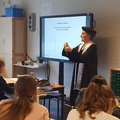
During ‘Meet the Professor’, four 3mE professors visited several Delft primary schools. They gave fifth and sixth grade pupils guest lessons dressed in togas.
17 January 2023
Visualising internal stresses in solid polymers using colour-changing Spiropyrans
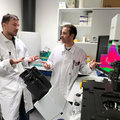
Spiropyrans are chemicals that change colour when you shine light on them – a useful property in many areas of medicine and technology. Now Georgy Filonenko and his colleague, Richard Janissen at the Faculty of Applied Science have discovered a new use for these so-called photochromic molecules - visualising stresses in solid polymers. Their research is published in the ‘Journal of the American Chemical Society.’
16 January 2023
New methods to investigate the interface between biomaterials and cells to help regenerate body tissues
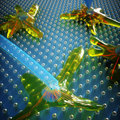
Lidy Fratila-Apachitei and Murali Ghatkesar received a Cohesion grant to investigate how 3-D printed pillars with features in the sub-micrometre range can affect adhesion and mechanics of living progenitor cells at single cell level. Together with postdoc researcher Livia Angeloni and the other collaborators, they developed and applied a novel method based on fluid force microscopy.
16 January 2023
In search of the coveted safer, better, longer-lasting battery: BatteryNL kicks off
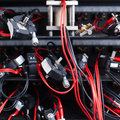
On the 12th of January a large number of parties involved in the development of batteries in the Netherlands – small companies, multinationals and knowledge institutes – attended the kick off of the BatteryNL consortium. Their goal is to develop the next generation of batteries within eight years based on a better understanding of material interfaces.
11 January 2023
Talking future of TU Delft in the ESP Lab with Robbert Dijkgraaf (the current Minister of Education, Culture and Science)
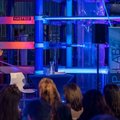
Today TU Delft and TenneT TSO B.V. welcomed Robbert Dijkgraaf (the current Minister of Education, Culture and Science | Ministerie van Onderwijs, Cultuur en Wetenschap) to the ESP Lab. The ESP Lab is the place where the Dutch electricity grid is being prepared for the future. This morning we spoke with the minister about promoting and encouraging gender diversity.
20 December 2022
Joost de Winter appointed Professor of Cognitive Human-Robot Interaction

De Winter’s research focuses on touchless interaction between robots and humans so that in the future, robots can read and understand the intentions and instructions of humans in their vicinity by means of eye-tracking and other sensors. And robots, in turn, will be able to adapt their functioning to communicate their own intentions both to nearby humans and other robots. The vision is to contribute to a future in which humans and robots share cognitive processes and adapt to each other.
19 December 2022
Rose Sharifian is speeding up!
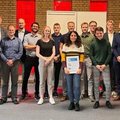
PhD defensed her thesis: "Electrochemical oceanic carbon capture using bipolar membrane electrodialysis" and begins her start-up company op CO2 removal
19 December 2022
Emergent behaviour in the energy transition

A research agenda including a concrete action plan for the following research challenges: behavioural theory and modelling of the energy transition, 2) anticipating emergent behaviour to scale up the energy transition, 3) developing transition narratives, and 4) embracing key/change agents and emergent leadership. The action items vary between quick wins and fundamental research ideas that may, together, help us to better shape the energy transition.
19 December 2022
EU Funds SeaClear2.0 for more underwater robots to collect heavier seafloor litter
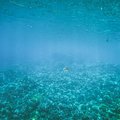
Following the success of SeaClear1, which showed that a system of autonomous robots can detect and remove litter from the seafloor, the European Union’s Horizon Europe programme has awarded a second project, SeaClear2.0, nearly 8 million euros to extend the use of multiple robots working together to identify and collect even heavier objects from deeper seas.